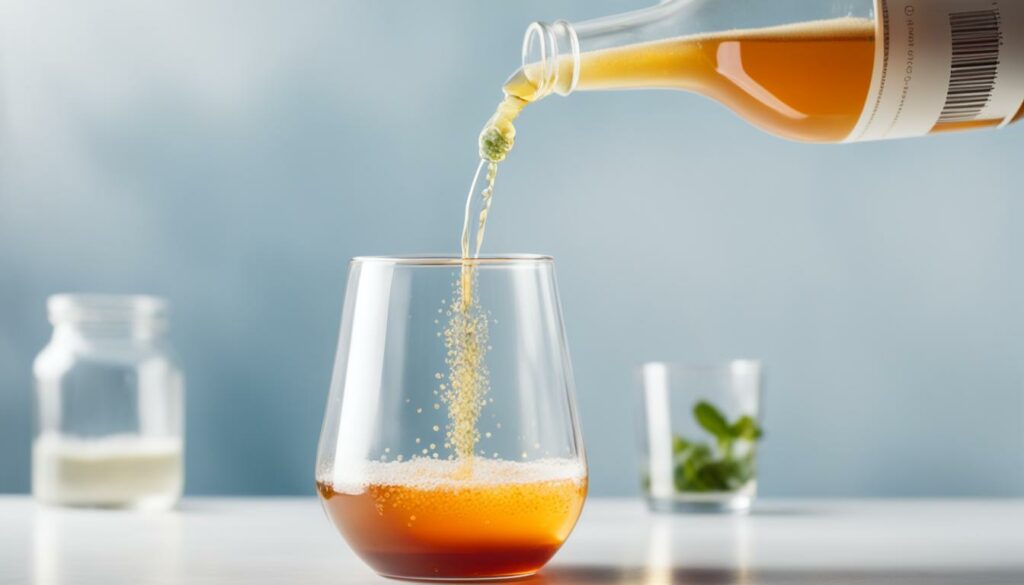Can Teens Drink Kombucha? Safety & Guidelines
Welcome to our article on kombucha and its safety for teenagers. Kombucha, a fermented and fizzy beverage made with black and green teas, has become increasingly popular for its unique taste and potential health benefits. However, it is important to understand the potential risks and guidelines associated with kombucha consumption, especially for teenagers.
Kombucha can vary in its composition, with some types being safe for children while others should be avoided. In this article, we will explore the sugar and alcohol contents of kombucha and discuss whether it is safe for teenagers to consume. Let’s dive in!
Key Takeaways:
- Kombucha is a fermented and fizzy beverage made with black and green teas.
- Store-bought and pasteurized kombucha is generally safe for children, while homemade and unpasteurized varieties should be avoided.
- Kombucha may contain small amounts of alcohol, but store-bought versions typically have alcohol levels similar to yeast bread.
- The sugar content of kombucha can vary significantly, and it is important to choose low-sugar or unsweetened varieties.
- Children may be drawn to the taste and fizziness of kombucha, but it is important to consider their sugar intake and choose healthier alternatives.
What is Kombucha?
Kombucha is a fermented drink made with tea, sugar, yeast, and bacteria. It has gained popularity due to its antioxidant, antimicrobial, and blood-sugar-lowering properties. Originating in China, kombucha is now available in various flavors and brands. However, when it comes to children, caution is advised as kombucha may contain added sugar and alcohol.
Kombucha’s Alcohol Content

Kombucha is a popular fermented beverage that is made by fermenting sweetened tea with a symbiotic culture of bacteria and yeast (SCOBY). During the fermentation process, the yeast in the SCOBY consumes the sugar in the tea and produces alcohol as a byproduct. The alcohol content in kombucha can vary depending on various factors such as the fermentation time, temperature, and the type of yeast used.
In store-bought kombucha, the alcohol content is regulated to be less than 0.5% ABV (alcohol by volume), similar to the alcohol content found in yeast bread. This low alcohol level is generally considered safe for most individuals, including teenagers. However, it is important to note that homemade and unpasteurized kombucha may have higher alcohol levels, which can pose risks, especially for underage individuals.
It is crucial to pay attention to the alcohol levels in kombucha, particularly when it comes to teenagers and those who are underage. As with any alcoholic beverage, consuming kombucha with higher alcohol content can have negative effects on underage individuals, similar to consuming light beers or other alcoholic beverages.
To ensure the safety of teenagers, it is recommended to choose store-bought kombucha that complies with the regulated alcohol content limit. This way, you can enjoy the refreshing taste of kombucha without worrying about the potential risks associated with higher alcohol levels.
Let’s take a closer look at the alcohol levels in different types of kombucha:
| Kombucha Type | Alcohol Content |
|---|---|
| Store-Bought Kombucha (regulated) | Less than 0.5% ABV |
| Homemade Kombucha | Variable, potentially higher than the regulated limit |
As you can see, store-bought kombucha with regulated alcohol content is a safer option, especially for teenagers. It is important to read the labels and choose kombucha products that comply with the regulated alcohol limits to ensure the well-being of underage individuals.
Kombucha Fermentation Process
The fermentation process is what gives kombucha its unique properties, including the fizziness and the slight alcohol content. During fermentation, the SCOBY consumes the sugar in the tea and produces various compounds, including acetic acid, carbon dioxide, and small amounts of alcohol. The bacteria in the SCOBY convert the alcohol into acetic acid, giving kombucha its characteristic tangy flavor.
It’s important to note that the fermentation process in kombucha is dynamic and can continue even after bottling. This means that if kombucha is not properly stored or if the fermentation time is extended, the alcohol content can increase over time, making it even more important to choose store-bought kombucha with regulated alcohol levels for teenagers.
In summary, kombucha’s alcohol content is regulated to be less than 0.5% ABV in store-bought varieties. Homemade and unpasteurized kombucha may have higher alcohol levels, which can pose risks, especially for teenagers. By choosing kombucha with regulated alcohol content, you can enjoy the benefits of this fermented beverage without worrying about the negative effects of excessive alcohol consumption.
Kombucha’s Sugar Content

When it comes to kombucha, the sugar content can vary significantly depending on the brand and flavor. This popular fermented beverage is typically sweetened with added sugars to kickstart the fermentation process. However, it’s important to be mindful of the amount of sugar in kombucha, especially for children’s consumption.
A study conducted on different kombucha brands found that sweetened varieties can contain high amounts of added sugars. In fact, some sweetened kombuchas have been found to contain up to 46 times more sugar than their unsweetened counterparts and even 11 times more sugar than most sweetened sodas.
To make informed choices about kombucha and manage your child’s sugar intake, it is crucial to read the nutrient labels carefully. Look for low-sugar or unsweetened kombucha options, as they can be a healthier choice for your child’s well-being.
| Kombucha Brand | Sugar Content (per 8 oz serving) |
|---|---|
| Brand A | 6g |
| Brand B | 12g |
| Brand C | 18g |
| Brand D | 24g |
| Brand E | 30g |
The table above illustrates the sugar content of various kombucha brands per 8-ounce serving. As you can see, there can be a significant difference in sugar levels among different brands. It’s important to note that these values may vary depending on the flavor and formulation of the specific kombucha.
By choosing low-sugar or unsweetened kombucha options, you can help limit your child’s sugar intake without compromising their enjoyment of this popular beverage. Encouraging healthier choices from an early age can contribute to their overall well-being and promote a balanced diet.
Taste Preferences and Kids

When it comes to kids’ taste preferences, fizzy drinks and sweet beverages often take the spotlight. Kombucha, with its fizzy nature and fruity flavors, may capture the attention of children, drawing associations with popular soda drinks. However, their affinity for sweetness might make them gravitate toward sweetened or fruit-flavored kombuchas, overlooking the unsweetened ones that offer a more tart or earthy taste.
To make a healthier choice for children, it is crucial to consider the sugar content of kombucha. Opting for low sugar varieties can be a better alternative to sugary drinks like sodas, providing the fizzy experience that kids enjoy without excessive sugar intake.
Understanding Kids’ Taste Preferences
Children have a natural inclination towards sweet flavors, which is why they often find sodas and other sugary drinks appealing. The combination of fizziness and sweetness in these beverages creates a sensory experience that kids enjoy. Unfortunately, the excessive consumption of sugary drinks can contribute to various health issues, such as tooth decay and an increased risk of obesity.
While it’s understandable that children might be drawn to sweetened or fruit-flavored kombuchas, which mimic the taste profile of their favorite fizzy drinks, it is important to guide them towards healthier options. By introducing them to unsweetened kombuchas that offer a more nuanced flavor profile, we can encourage them to develop a taste for beverages that are not overly sugary.
“It’s crucial to introduce children to a variety of flavors and teach them to appreciate different taste profiles. By broadening their palate and guiding them towards healthier choices, we can help them develop lifelong habits that prioritize their well-being.”
— Dr. Jane Thompson, Registered Dietitian
Choosing kombucha flavors that are less sweet and more balanced can help children develop a taste for a wider range of flavors while still enjoying the fizziness they love. By gradually reducing their exposure to highly sweetened beverages and introducing them to low sugar kombucha options, we can make a positive impact on their overall health and well-being.
| Comparison of Kombucha Varieties | Sugar Content per 8 oz (240 mL) serving |
|---|---|
| Unsweetened Kombucha (e.g., Original or Plain) | 0 grams |
| Fruit-Flavored Kombucha (e.g., Strawberry, Mango) | 2-4 grams |
| Sweetened Kombucha (e.g., Lemonade, Ginger Ale) | 11-20 grams |
| Soda (Cola, Fruity Flavors) | 22-39 grams |
As the above table illustrates, unsweetened kombucha contains no added sugars, making it the healthiest option. Fruit-flavored kombuchas contain a small amount of added sugars, providing a hint of sweetness without excessive intake, while sweetened kombuchas have higher sugar content that is still considerably lower than traditional sodas.
By making informed choices and selecting low sugar kombucha varieties, parents can ensure that their children’s taste preferences are satisfied without compromising their health. It’s important to introduce children to a balanced variety of flavors and help them understand the benefits of making nutritious choices.
Empowering kids to appreciate the natural flavors of foods and beverages and guiding their taste preferences towards healthier options can set them on a lifelong path of optimal wellness.
Safety Guidelines for Teens
When it comes to kombucha consumption for teenagers, it’s important to follow safety guidelines to ensure their well-being. While store-bought and pasteurized kombucha with negligible alcohol levels (less than 0.5% ABV) are generally safe for children ages 4 and older, caution must be exercised when it comes to homemade and unpasteurized kombucha.
Homemade kombucha may have higher alcohol content due to the fermentation process, making it unsuitable for children and teenagers. To promote safe kombucha consumption for teens, it is recommended to adhere to the following guidelines:
- Limit intake: Teenagers ages 4 and older should consume no more than 2-4 ounces (60-120 mL) of kombucha per day.
- Choose low sugar options: Opt for kombucha with low sugar content to reduce the risk of cavities and other health issues associated with excessive sugar intake.
Kombucha can be incorporated into a teenager’s diet as a refreshing and healthier beverage option. However, it’s essential to prioritize safety by reading labels, limiting daily intake, and considering alternative sources of hydration and probiotics. By following these kombucha safety guidelines, parents and guardians can ensure that teenagers can enjoy this beverage responsibly.
Health Benefits and Risks
While kombucha is often marketed as a health drink and contains probiotics that are beneficial for gut health, scientific research on its health benefits, specifically in children, is limited. The potential risks of consuming kombucha include bacterial contamination, especially in home-brewed versions, and the alcohol content. Children with compromised immune systems and those taking certain medications should avoid kombucha. It is recommended to obtain probiotics from other sources and maintain a balanced diet.
Kombucha health benefits:
- Probiotics: Kombucha contains live bacteria and yeast that can help support a healthy gut microbiome. These probiotics may promote digestive health and boost the immune system.
- Antioxidants: Kombucha is a source of antioxidants, which can help protect the body against oxidative stress and potentially reduce the risk of chronic diseases.
- Potential Detoxification: Some proponents of kombucha claim that it aids in detoxification by supporting liver function, although more scientific research is needed to confirm these effects.
Potential health risks of kombucha:
- Bacterial Contamination: Home-brewed kombucha carries a higher risk of bacterial contamination, which can result in food poisoning and other gastrointestinal issues. Store-bought and pasteurized kombucha products are generally safer in terms of bacterial contamination.
- Alcohol Content: Kombucha is a fermented drink and may contain trace amounts of alcohol. While commercial products adhere to regulations and have alcohol levels below 0.5% ABV, home-brewed kombucha may have higher alcohol content. This is particularly important to consider for underage individuals.
- Adverse Effects in Certain Individuals: People with compromised immune systems, pregnant women, and individuals taking medications that interact with alcohol should avoid consuming kombucha. It is always advisable to consult with a healthcare professional before including it in the diet.
It’s important to note that while kombucha can offer potential health benefits, these should be weighed against the potential risks, particularly for children and individuals with specific health conditions.
Table: Comparison of Kombucha Health Benefits and Risks
| Benefits | Risks |
|---|---|
| Probiotics for gut health | Bacterial contamination in home-brewed kombucha |
| Antioxidant properties | Potential alcohol content |
| Possible detoxification support | Adverse effects in certain individuals |
Dental Considerations
Kombucha is highly acidic, with a pH similar to white wine vinegar. This high acidity can have negative effects on dental health, including enamel erosion and an increased risk of cavities and tooth decay. While the impact may be more significant for children with baby teeth, it is important for individuals of all ages to be mindful of the potential dental risks associated with kombucha consumption.
Enamel erosion occurs when the protective outer layer of the teeth is worn away by acids. The acidic nature of kombucha can contribute to this erosion, leaving teeth vulnerable to damage and decay. It is particularly crucial to take precautions when it comes to children, as their tooth enamel is still developing.
Quote: “The acidic nature of kombucha can lead to enamel erosion, increasing the risk of cavities and tooth decay.” – Dr. Sarah Johnson, Pediatric Dentist
To protect dental health, it is recommended to limit exposure to acidic beverages like kombucha. While kombucha can be a flavorful and refreshing drink, children should be encouraged to choose water as a safer and healthier alternative to protect their teeth. Water not only helps to maintain hydration but also aids in rinsing away food particles and acids that can lead to enamel damage.
Encouraging children to establish good oral hygiene habits, such as regular brushing and flossing, can also help mitigate the potential dental risks associated with kombucha acidity. By maintaining a consistent dental care routine and making informed choices about beverage consumption, individuals can promote their overall oral health and reduce the likelihood of dental issues.
“It’s important to be mindful of the acidity in kombucha and its potential effects on dental health. Encouraging children to choose water and practice good oral hygiene will help protect their teeth.” – Dr. Sarah Johnson, Pediatric Dentist
Kombucha pH Comparison
Here is a comparison of the pH levels of various beverages, highlighting the acidic nature of kombucha:
| Beverage | pH Level |
|---|---|
| Kombucha | 2.5-3.5 |
| White Wine Vinegar | 2.4-3.0 |
| Lemon Juice | 2.0-2.6 |
| Cola | 2.5-4.0 |
As shown in the table, kombucha’s pH falls within the same acidic range as white wine vinegar and lemon juice. This emphasizes the importance of considering the potential effects of kombucha on dental health.
Conclusion
In summary, kombucha can be a safe beverage option for teenagers when consumed responsibly and in accordance with safety guidelines. It is recommended to choose store-bought, pasteurized kombucha with low alcohol content and low sugar variants for children aged 4 and older. Reading labels carefully and limiting daily intake are crucial in ensuring the health and well-being of teenagers.
While kombucha does offer potential health benefits, such as probiotics for gut health, it is important to note that scientific research on these benefits, especially in children, is limited. As such, it is advisable to obtain probiotics from other sources and maintain a balanced diet to support optimal health.
Moreover, it is essential to prioritize dental health by avoiding excessive consumption of acidic beverages like kombucha. The high acidity levels in kombucha can contribute to enamel erosion and increase the risk of cavities and tooth decay. Encouraging teenagers to choose water as their primary source of hydration is a safer and healthier option for maintaining strong and healthy teeth.
Overall, by following these guidelines and considering alternative sources of hydration and probiotics, kombucha can be enjoyed by teenagers as part of a well-balanced and mindful approach to their overall health and wellness.
FAQ
Can teens drink kombucha?
Yes, teens can drink kombucha, but it is important to follow safety guidelines and consider certain factors such as alcohol and sugar content.
What is kombucha?
Kombucha is a fermented drink made with tea, sugar, yeast, and bacteria. It is known for its potential health benefits and is available in various flavors and brands.
How much alcohol is in kombucha?
Store-bought kombucha has less than 0.5% alcohol content, similar to yeast bread. However, homemade and unpasteurized kombucha may have higher alcohol levels.
How much sugar does kombucha have?
The sugar content in kombucha can vary significantly depending on the brand and flavor. It is important to choose low sugar or unsweetened options to limit sugar intake.
Do kids prefer sweetened kombucha?
Children may prefer sweetened or fruit-flavored kombuchas over unsweetened ones. It is important to consider the sugar content and choose low sugar varieties as a healthier alternative to sodas and other sugary drinks.
What are the safety guidelines for teens consuming kombucha?
Teens should consume store-bought, pasteurized kombucha with low alcohol and sugar content. It is recommended to limit kombucha intake to 2-4 ounces per day and consider alternative sources of probiotics and hydration.
What are the health benefits and risks of kombucha?
While kombucha has potential health benefits, scientific research on its benefits for children is limited. The risks include bacterial contamination and the alcohol content. Children with compromised immune systems and certain medications should avoid kombucha.
Does kombucha affect dental health?
Kombucha is highly acidic, which can lead to enamel erosion and an increased risk of cavities and tooth decay. It is important to prioritize dental health and encourage children to drink water instead.
Can you summarize kombucha safety for teens?
Teens can drink kombucha in moderation by choosing store-bought, pasteurized kombucha with low alcohol and sugar content. It is essential to read labels, limit daily intake, and prioritize dental health by avoiding excessive consumption of acidic beverages like kombucha.







